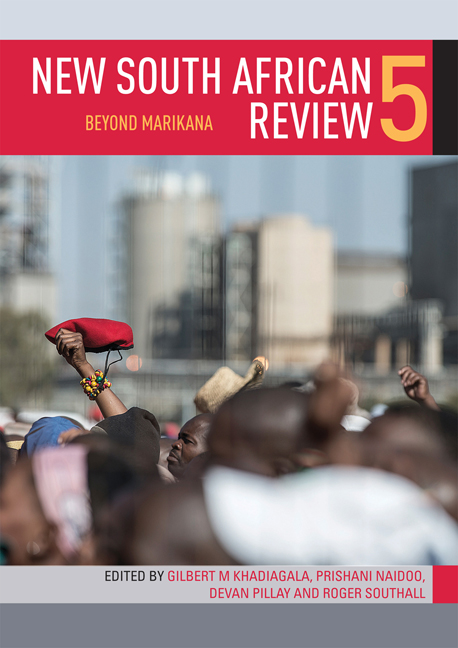Book contents
- Frontmatter
- Contents
- Preface
- Introduction: Political reconfigurations in the wake of Marikana
- PART 1 NEW POLITICAL DIRECTIONS?
- Chapter 1 Reconstituting and re-imagining the left after Marikana
- Chapter 2 Labour and community struggles 1994-2014
- Chapter 3 Half full or half empty? The Numsa moments and the prospects of left revitalisation
- PART 2 ECONOMY, ECOLOGY AND LABOUR
- PART 3 STATE AND SOCIETY
- PART 4 SOUTH AFRICA IN THE INTERNATIONAL ARENA
- Contributors
- Index
Chapter 3 - Half full or half empty? The Numsa moments and the prospects of left revitalisation
from PART 1 - NEW POLITICAL DIRECTIONS?
Published online by Cambridge University Press: 21 April 2018
- Frontmatter
- Contents
- Preface
- Introduction: Political reconfigurations in the wake of Marikana
- PART 1 NEW POLITICAL DIRECTIONS?
- Chapter 1 Reconstituting and re-imagining the left after Marikana
- Chapter 2 Labour and community struggles 1994-2014
- Chapter 3 Half full or half empty? The Numsa moments and the prospects of left revitalisation
- PART 2 ECONOMY, ECOLOGY AND LABOUR
- PART 3 STATE AND SOCIETY
- PART 4 SOUTH AFRICA IN THE INTERNATIONAL ARENA
- Contributors
- Index
Summary
INTRODUCTION
The 2014 national elections once again saw the ruling African National Congress (ANC) returned with a handsome majority of 62 per cent of votes cast. For the ANC and its allies the South African Communist Party (SACP) and the Congress of South African Trade Unions (Cosatu) this reaffirms the overwhelming popularity of the national liberation movement, and endorses its current leader, Jacob Zuma. The ANC, they assert, can now move ahead with bolder, more ‘radical’ socioeconomic policies. Those who criticise the ruling Alliance from the left are, in their eyes, ‘pretenders’ and ‘charlatans’; either ‘adventurist populists’, ‘narrow ultra-left workerists’ or ‘syndicalists’. For ANC/SACP supporters, the party of Nelson Mandela, despite its challenges of incumbency, remains the only true voice of the left.
This conviction has been roundly challenged. Critics point out that in fact most people did not vote ANC during the last elections. Indeed, if the total eligible votes of 31.4 million are counted, the ANC only received a mandate from 11.4 million (or 36.4 per cent) of the electorate. Most either did not register to vote, or registered but failed to pitch up at the polling booth. This indicates a high degree of alienation among voters, in a context of increasing levels of local ‘service-delivery’ protests and industrial action.
A key factor that has spurred on this alienation is rising social inequality, with a new black elite joining the ranks of the established white elite, whereas the working poor and unemployed struggle to make ends meet. It is this that provoked mineworkers in the platinum sector to go on strike in 2012, demanding a living wage – which tragically ended in the police massacre of thirty-four mineworkers at Marikana. Not since 1922 had police in South Africa fired on striking workers, and the bloodbath shook South Africans to the core. Many left the ANC as a result, including such stalwarts as Ronnie Kasrils (Pillay 2013).
Increasing corruption compounds the problem of alienation from the ruling party, with a president overtly engaging in dubious practices, such as spending around R240 million on security upgrades at his rural Nkandla residence. Reports of severe corruption in all spheres of government and the public service since Zuma became president are now daily news.
- Type
- Chapter
- Information
- New South African Review 5Beyond Marikana, pp. 48 - 62Publisher: Wits University PressPrint publication year: 2015



